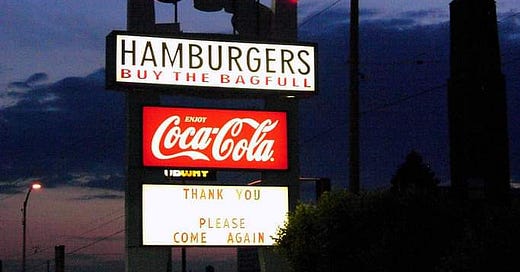In 1977, as my family drove past the legendary Spokane fast food joint, my little sister inhaled deeply through her nose and said, “Man, I love the smell of Dick’s.”
My father was laughing so hard that he had to pull over the car so we wouldn’t get in a wreck.
Over the years, I saw three late-night fights in the parking lot.
There was a slapstick brawl where two drunk men kept throwing and missing punches and falling down. After a few minutes, they were so exhausted that they both surrendered and slumped away.
I witnessed another bout where a muscular teen knocked out one adult jerk and then flattened an innocent man.
“Why did you hit him?” asked a spectator.
“Because he was cheering,” the teen said.
“But he was cheering for you.”
The teen pondered that info then said, “Yeah, but he was still distracting me.”
And I saw a third fight where a young woman, tall and strong, held a little guy by the throat with one hand, swung a huge trophy with the other hand, and kept screaming, “I’m the state champion,”
But she never said of what sport.
As poor as we were, my family usually had enough cash to buy a few burgers and fries, though we’d sometimes have to share items. My silly big brother always wanted the mini-pizza. Yeah, he preferred a sad mini-pizza to the best hamburger in Spokane. I need to ask him about that.
Trust me, the hamburgers are great. This is not competely about nostalgia. The food is all glorious grease and salt.
Okay, this is mostly about nostalgia. Dick’s would’ve been the primary location if American Graffiti had been filmed in Spokane.
And thank God that Dick’s has remained mostly the same—still as provincial as ever—even as Spokane has strived to become something more cosmopolitan.
Imagine that! A cosmopolitan Spokane!
There’s a special kind of sadness that arrives when white people gentrify other white people.
My late father and I always ordered the Deluxe with a Diet Coke and fries, along with three or four little cups of tartar sauce.
I miss my father.
I’m sad that I don’t remember the last time he and I shared a meal at Dick’s.
One Thursday night during a college break, I ended up at Dick’s with two high school friends. While standing in one line, I saw a familiar redhead standing in the line three lines over. I recognized her face but I couldn’t place how I knew her.
Then, after a few minutes, I remembered she was the Jehovah’s Witness who regularly visited me—who testified in the doorway—at my college apartment.
I’d always had a little crush on her. She was kind, smart, and didn’t seem fully committed to her religion.
Waiting for my hamburger, I saw that she recognized me, too, but neither of us approached the other.
A few weeks later, she knocked on my apartment door. She handed me the latest J.W. literature and said, “I saw you at Dick’s a while back but I was too shy to say hello. I didn’t think you’d want to explain to your friends how you knew me.”
And, God, I was too bashful in that moment to confess that I’d been too bashful to approach her at Dick’s. But we smiled at each other in my doorway and there seemed to be a moment of frission between us. Just a brief possibility. Then it was over and she told me some Biblical story that I don’t remember.
I wonder if she had a crush on me. I wonder if I, as a reservation Indian boy, represented something forbidden to her. It’s hilarious to think that I, a bookish nerd, could ever be seen as forbidden.
Most likely, I was just another assignment to her, another college kid who needed to be saved. But it’s fun to think about writing a fictional story where an Indian college kid falls in love with a white Jehovah’s Witness proselytizer. And it’s even more fun to think of a fictional story where an Indian college boy and a J.W. white girl missionary become non-romantic best friends.
That story would have to be about forgiveness.
She never came to my door again but I did see her on campus once. She was exiting a building as I was entering.
“Oh,” I said. “I didn’t think you were a student.”
“I’m not,” she said. “I work in the lab.”
I didn’t ask her which lab. I just smiled and said goobye. Or maybe I said “I’ll see you later.” I don’t remember. In any case, I’ve never seen her again.
As I was writing this essay, I looked up the basic beliefs of the Witnesses and learned that their Holy Trinity is like a scalene triangle—all three sides are of uneven length. God is superior to Jesus and the Holy Spirit is God’s force and not a separate entity.
I think that our memories—our capacities to remember— might be scalene triangles. Time, place, and emotion are of uneven and unpredictable lengths.
Can anybody explain how one person can occupy only a few quiet and uneventful hours in your life but be so clearly and eternally remembered?





Great story. I’m itching for some small town burgers and fries myself now, although I googled Spokane, and saw its estimated population is around 600,000, which makes it similar in size to my hometown of Constanta, which is one of the largest cities in Romania. Is a 600k city considered small in the U.S.?
thanks, Sherman. A Spokane story that tweaks memories of my Daddy...minus Dicks.